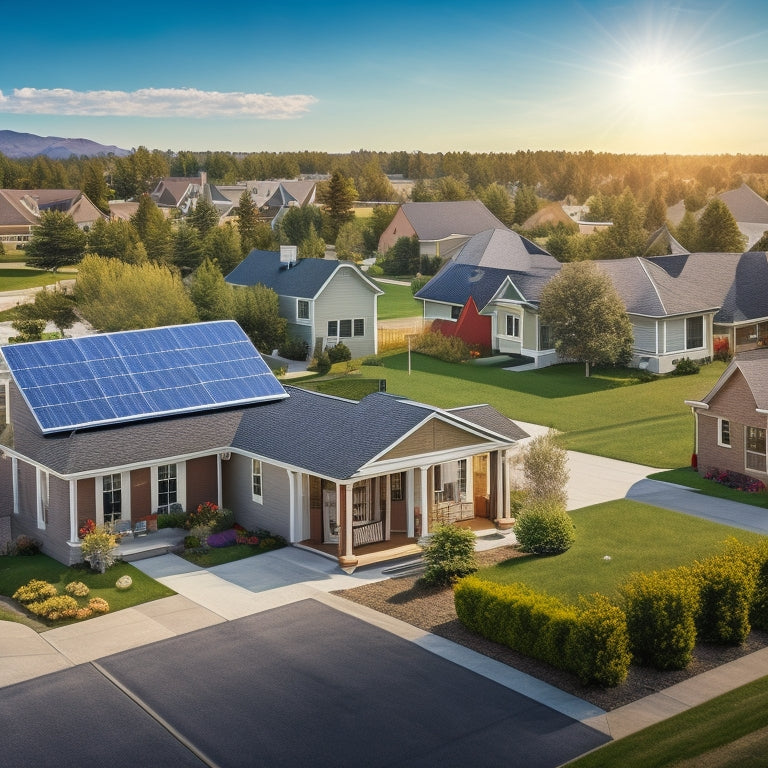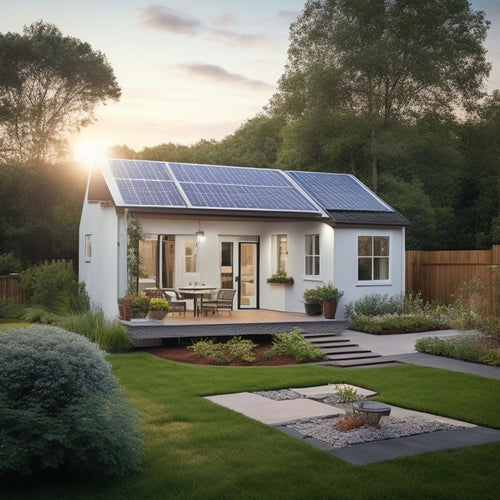
3 Best Home Solar Panel Installation Cost Options
Share
You're considering investing in a home solar panel installation, and the cost is a top concern. The average cost of solar panels ranges from $2.50 to $3.50 per watt, depending on the system size, equipment type, and installation company. You have three main financing options: cash purchase, solar loans, and Power Purchase Agreements (PPAs). Top brands like Tesla, SunPower, and Panasonic offer high-efficiency panels, with prices ranging from $2.50 to $3.50 per watt, including installation costs. Understanding the costs and financing options is essential; exploring the specifics of each will help you make an informed decision for your home.
Key Takeaways
• The average cost of a solar panel system ranges from $2.50 to $3.50 per watt, depending on system size and equipment type.
• Financing options include cash purchase, solar loans, and Power Purchase Agreements (PPAs), each with pros and cons.
• Top brands like Tesla, SunPower, and Panasonic offer high-efficiency panels with 25-30 year warranties and prices ranging from $2.50 to $3.50 per watt.
• Government incentives like the Solar Investment Tax Credit (ITC) can help reduce the upfront cost of solar panel installation.
• Energy savings analysis should consider current consumption, electricity rates, and system size to determine the best installation cost option.
Average Cost of Solar Panels
On average, you can expect to pay between $2.50 and $3.50 per watt for a solar panel system, with the total cost depending on the size of the system you need. The overall cost will also depend on factors such as the type and quality of equipment, installation company, and local permits.
When considering the cost, it's essential to think about the long-term benefits. A key factor in determining the return on investment is solar panel efficiency. The higher the efficiency, the more energy your system will produce, resulting in greater energy savings.
To quantify these savings, an energy savings analysis will help you understand the financial benefits of going solar. This analysis will take into account variables such as your current energy consumption, local electricity rates, and the size of your solar panel system.
Financing Options for Homeowners
You have several financing options available when investing in a solar panel system for your home, including cash purchases, solar loans, and power purchase agreements. Each option has its pros and cons, and it's important to understand them before making a decision.
Here's a breakdown of the financing options:
| Financing Option | Advantages | Disadvantages |
|---|---|---|
| Cash Purchase | No interest or fees, Government incentives | High upfront cost |
| Solar Loan | Lower upfront cost, Government incentives | Interest rates apply |
| Power Purchase Agreement (PPA) | Leasing benefits, no upfront cost | No Government incentives, Leasing contract |
When considering financing options, it's crucial to factor in Government incentives, such as the Solar Investment Tax Credit (ITC), which allows homeowners to claim a tax credit of 26% of the total cost of their solar panel system. Additionally, Leasing benefits, such as little to no upfront cost, can be appealing. However, it's important to weigh the pros and cons of each option to determine which one best suits your financial situation and energy needs.
Top Brands and Their Prices
With financing options in place, you can now focus on selecting a top-tier solar panel brand that fits your budget and energy requirements. When it comes to the top brands, you'll want to take into account factors like warranty comparisons and panel efficiency to make sure you're getting the most bang for your buck.
Leading brands like Tesla, SunPower, and Panasonic offer high-efficiency panels with warranties ranging from 25 to 30 years. For instance, Tesla's Solar Roof tiles boast an impressive 25-year warranty and 22.1% panel efficiency, making them a top choice for homeowners seeking sleek design and maximum energy output.
SunPower's X-Series Residential Solar Panels, on the other hand, offer a 25-year warranty and 22.8% panel efficiency, making them ideal for those seeking maximum energy production.
When comparing prices, you'll find that premium brands like these can range from $2.50 to $3.50 per watt, depending on the specific model and installation costs. Be sure to research and compare prices, warranties, and panel efficiencies to find the best fit for your energy needs and budget.
Frequently Asked Questions
Do Solar Panels Increase My Property's Resale Value?
You'll likely see an appraisal boost, as solar panels increase your property's resale value, especially if they're in line with neighborhood trends, making your home more attractive to environmentally conscious buyers.
Can I Install Solar Panels on a Mobile Home?
As you weigh the benefits of solar power, coincidentally, you're wondering if you can install solar panels on your mobile home. Fortunately, you can, but you'll need to obtain mobile permits and make sure your home's foundation can support the added weight.
How Long Does a Typical Solar Panel Installation Take?
You'll typically spend 2-5 days waiting for permits, and 1-3 days on installation, depending on your project's complexity, with labor costs factored into the overall project timeline, which can range from 5-14 days in total.
Are There Any Solar Panel Maintenance Requirements?
You'll need to perform routine maintenance to make sure your solar panels operate efficiently. Regularly clean your panels to remove debris, and inspect your battery regularly to prevent damage and extend its lifespan.
Can I Install Solar Panels on a Roof With Skylights?
You'll need to assess if skylights will obstruct solar panels or cause roof penetration issues, ensuring a secure and efficient installation that maximizes energy output without compromising your roof's integrity.
Related Posts
-

Why Choose Affordable Electric Scooters for Urban Commuting
By choosing an affordable electric scooter for urban commuting, you'll not only reduce your transportation costs by u...
-

What Are the Safety Certification Requirements?
You need to make sure your electric scooter meets rigorous safety certification requirements to guarantee a safe ride...
-

5 Essential Tips for Your DIY Home Solar System
To guarantee a successful DIY home solar system installation, you'll need to assess your energy consumption, choosing...


